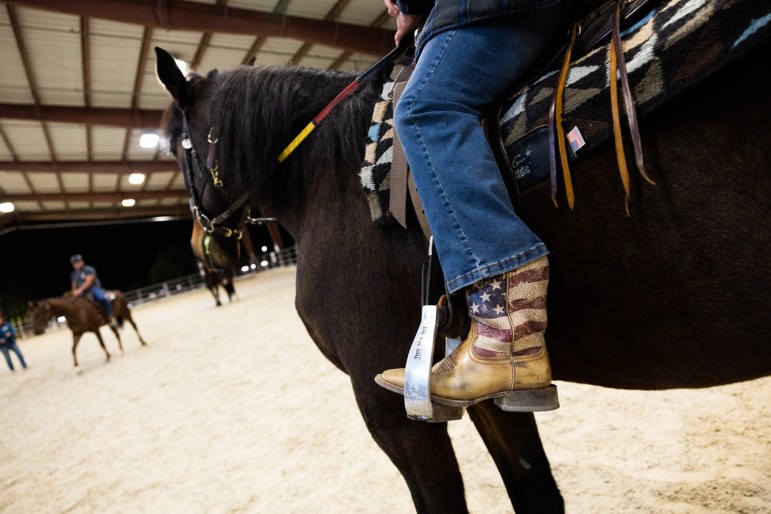For some veterans, coming back home is a rougher transition than anticipated.
Talking about what vets experienced during war isn’t necessarily what some are ready to talk about, particularly in a therapy room, shared Paul Worley, 42, a Rancho Mission Viejo resident and Marine Veteran who did five tours in Iraq and two in Afghanistan.
But at The Shea Center in San Juan Capistrano, equine therapy is offering combat veterans a way to open up.
A miracle, as Worley put it.
“We have seen lives, marriages, and families saved,” shared Worley, who is also barn manager at the center.
Veterans can work through significant trauma in a much shorter period of time than in a traditional office setting, according to The Shea Center’s Mental Health Clinician, Leeanna Rice, 34, who developed and runs the mental health program at the Shea Center, which includes equine facilitated psychotherapy and equine assisted learning.
The military program is just one of her specialties.
In past work with vets in Pennsylvania, Rice recalls a vet who couldn’t bring himself to speak about something he labeled “The really bad thing,” and addressed it as such for nine months.
“One day, I decided to have him [veteran] walk to the far end of the round pen where I couldn’t hear him and tell his horse what it was,” shared Rice.
“And he did it. At the end, I asked him, ‘What happened when you told your horse what the really bad thing was?’ And he said, ‘Nothing, nothing happened,’ and I said, ‘Okay, what does that tell you?’ And he says, ‘My world’s not going to end if I tell somebody what happened.”
According to Rice, the horse can act as a biofeedback machine during the sessions, letting veterans analyze their behaviors and their real-life implications.
One study found that “87.1% of veteran participants reported ‘very positive perceived benefit’ regarding relief from their PTSD symptoms,” with the help of equine therapy.
“So instead of just sitting in an office and being like, ‘yeah, maybe I shouldn’t come in yelling at everybody,’ because that’s not really helpful to my family, they get to see what happens to a horse when they come in to the round pen, and they’re super angry, and the horse immediately responds.”

Horses are akin to being in herds, which means they seek a leader.
And those leaders are the vets.

“The very first week, we put them in the round pen, and we’re looking at body language and talk about how the horse is a herd animal. It’s a prey animal and how they, how they read body language, and I would have some of these big, tough, strong military men fearful of going in the round pen,” shared Janelle Robinson, 56, Chief Program Officer at the Shea Center.
Veterans spend the first four weeks on the ground pen work, horse psychology, packing, mounting work, learning about horses, and grooming.

“I found early on that tacking and grooming, getting the horses ready, I was like, ‘why are they taking so long with the horse? Let’s go!’ And they [veterans] were in there having a conversation with their horse, you know, it was an animal that didn’t have any sort of judgment,” said Robinson.
“No judgment on who they are.”
Then, by week five, Robinson gets the vets on the horses.

Families are also out in the rings with horses.
Because families of vets can suffer too.
“There’s a term, they call it secondary PTSD, where your family kind of reacts to you. So both of my kids come here, they’re doing ground work with the horses are working with some of the other staff,” said David Ball, a Marine who served in Somalia in the early 90s.

With over 95,000 veterans in Orange County, there is a need for veteran services, especially mental health services, says the center.
“Some veterans have told us they have accomplished more than they would in talk therapy,” said Kelli Navarro, Equine Assistant Learning Program Facilitator at the center.
“A lot of these warriors come back and they’ve become really good students, because that’s what they’ve learned to do in the military, be a good student, “said Robinson, “they come home. and worlds kind of passed them by.”
“Many of them say to me, ‘Gosh, I can learn something new again.’ So it’s, it’s empowering, they [veterans] can learn something new. They understand how to regulate their emotions and relationships, they repair relationships, because the horse isn’t judgmental, but also shows them if they’re being unresponsive, flat, or hyper over responsive, aggressive.”
The equine therapy at the Shea Center is funded by their donors and grants.
Some donors have donated horses as well.
“It’s a happy place for the family. You know, and it’s something that my kids, and my wife and I all talk about, share about as a good memory for us. It’s good something to build on” said Ball.
“It’s making me become closer to my family like I should be.”

